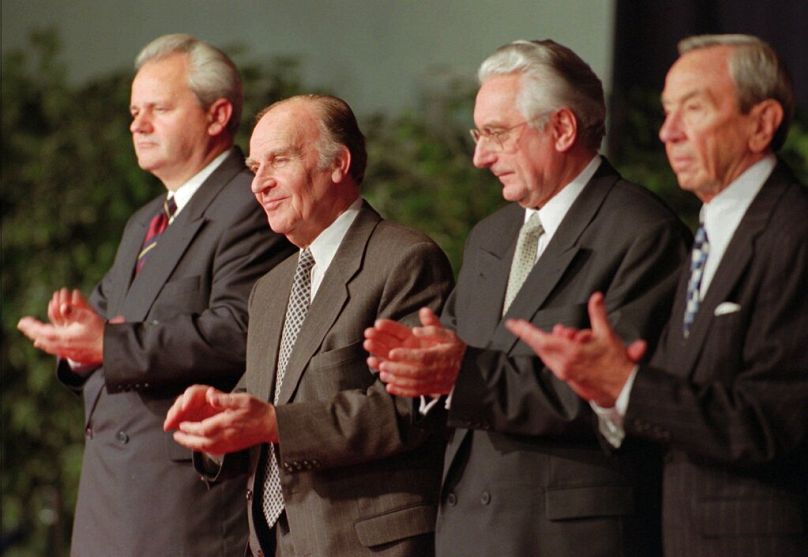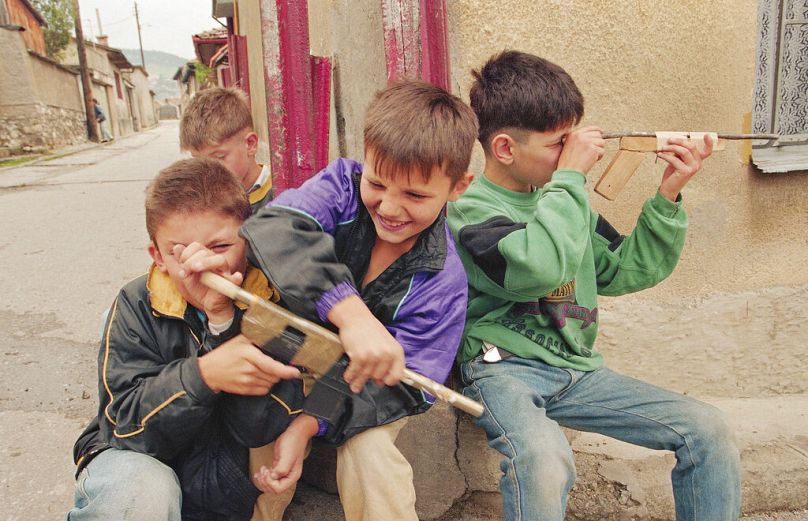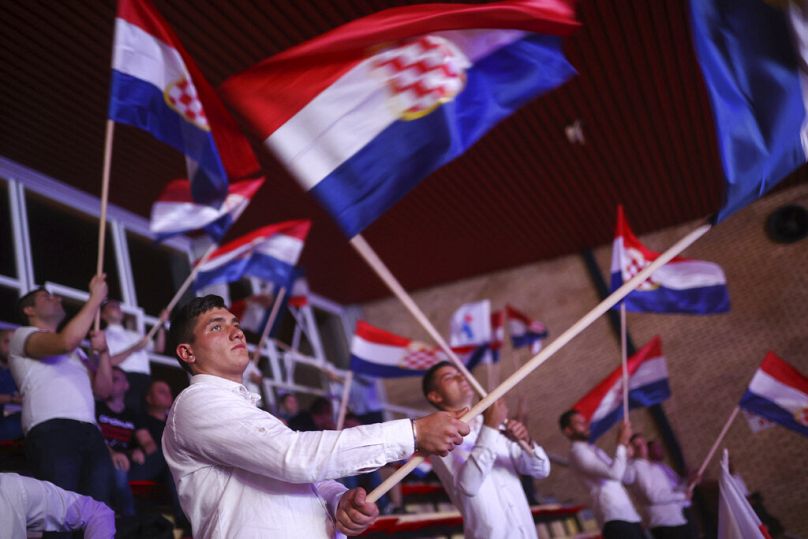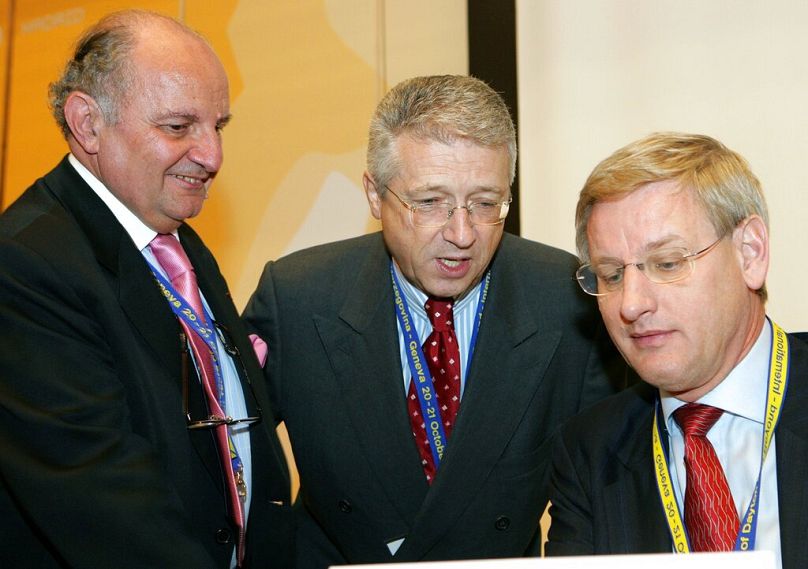As the votes were still being counted, High Representative Christian Schmidt used his powers on Sunday night to impose changes to one of the country's three constitutions and its electoral law. But what does that mean?
The biggest surprise of the Bosnian elections last Sunday was not found in the results themselves.
 ADVERTISEMENT
ADVERTISEMENT
 ADVERTISEMENT
ADVERTISEMENT
As the votes were being counted, the country’s peace envoy Christian Schmidt announced that he would be changing one of the country’s three constitutions — specifically, the one pertaining to the entity of the Federation of Bosnia and Herzegovina (FBiH) — as well as its electoral law.
The public outcry was immediate, with some of his critics calling the High Representative’s move “an illiberal putsch”.
But who is the High Representative, what did he change, and how does his decision affect Bosnia’s citizens?
How did Bosnia end up with an omnipotent power broker?
Bosnia experienced a bloody war between 1992 and 1995, considered to be the bloodiest conflict in Europe since World War II until Russia’s invasion of Ukraine in February.
The war saw 100,000 casualties, with two million people becoming either refugees or internally displaced, culminating in the genocide of Bosniaks in Srebrenica in July 1995.
Drafted to bring the war to an end in 1995, the US-sponsored Dayton Peace Accords created a dizzying maze of jurisdictions that enabled the country’s three main ethnic groups — the Eastern Orthodox Serbs, Catholic Croats and Muslim Bosniaks — to dominate domestic politics and exert control over key decision-making processes.
The peace agreement instituted two main administrative units in Bosnia: the Serb-dominated entity of Republika Srpska, or RS, and the Bosniak-Croat majority FBiH.
It also instituted the Office of the High Representative, a body financed by the international community with a mandate to enforce the civilian aspects of the peace accords.
What is the cause of the latest crisis in Bosnia?
High Representative Schmidt informed the Bosnian public that he used his powers to restructure the entity-level FBiH House of Peoples and how its delegates are chosen amid the country's general election, and right after polling stations closed on Sunday night.
The decision came just as the first preliminary results started trickling in, in an unprecedented choice to change rules mid-election and affect the indirect choice of voters.
The FBiH House of Peoples is the upper house of the entity parliament, designed to allow the three main ethnic groups to wield considerable decision-making power.
The body elects the entity's president and two vice presidents, who then appoint the prime minister and their cabinet. It also debates and can approve or veto motions passed by the lower house, the Parliamentary Assembly.
Prior to Sunday, its 58 delegates were chosen from 10 assemblies or cantonal parliaments, whereby each of the three main ethnic groups in the country got 17 seats. Seven additional seats belong to Others — a constitutional category encompassing minorities but also citizens who do not identify with any of the three main ethnic groups.
Schmidt said on Sunday the changes imposed would “improve the functionality of institutions in the FBiH and enable all citizens to have their voice heard and be represented by those they elected.”
His ability to change things like the constitution fall under the so-called Bonn Powers — granted to the High Representative by the office’s overseeing and financing body, the Peace Implementation Council.
Schmidt maintained that the current electoral law clashes with the entity-level constitution, while critics have accused him of colluding with the representatives of Bosniak Croats — who they claim are the only beneficiaries of these electoral changes.
The decision and its timing drew criticism from international quarters as well. European Parliament members Tineke Strik and Thomas Waitz from the Greens blasted it as “disrespectful” and “a slap in the face for the voters”.
While the US Embassy in Bosnia applauded Schmidt’s decision, stating that “Bosnians need and deserve a functional government”, while the EU mission to the country as well as top foreign affairs chief Josep Borrell took a step back from any involvement in a move “solely made by the High Representative”.
What did he change?
Schmidt introduced a series of changes, with the most significant revolving around the number of delegates. They have been upped from 58 to 80.
According to his decision, the new entity-level House of Peoples will now comprise 23 Bosniaks, Serbs and Croats each, along with 11 Others.
The increase in seats now allows Others to select a representative from each canton, which was not the case earlier.
However, the way the delegates are elected from cantonal assemblies has consolidated the three ethnic groups and their representatives and strengthened their power.
While the entire assemblies in each canton used to decide on which particular ethnic representatives would go to the House of Peoples, now it is only their ethnic caucus that gets to approve the delegates.
To simplify: Bosniaks decide which Bosniak peers from a certain canton will go to the House of Peoples, Serbs pick Serbs and Croats pick Croats, and the Others do the same thing.
The distribution of the number of delegates from each canton also favours big ethnonationalist parties and their candidates, the first analyses show.
"The legitimacy of the delegates is now purely ethnic," professor of constitutional law Nedim Ademović told Euronews.
"The body is not elected according to the 'one-person-one-vote' principle, but rather according to the principle of proportional representation of constitutive peoples."
"The High Representative should have limited the House of Peoples to solely providing identity-related protections, and not have it participate equally in all civic decisions which are ethnically neutral," he explained.
Other parts of the decision remove the ability of the delegates to block the election of the entity's president and his deputies, and take away the power of the president to name constitutional court judges.
Crucially, the constitutional court of FBiH has the final say in whether something constitutes vital national interest or not.
The vital national interest provision — allowing ethnic representatives to block legislation if they feel it hurts the interests of their ethnic group — has been narrowed down to specific issues.
“I think that this second group of solutions is good,” Ademović said.
“These offices were abused for political corruption, and even appointments were conditioned by various political and financial concessions allowing politicians the privilege of a leisurely life while not taking the citizens into account.”
Did the international community's envoy overstep the line?
“It’s not democratic to change rules pertaining to how the government is formed after the elections,” said Ademović, one of the country’s foremost experts on constitutional law.
“It’s unfair to both the voters and political subjects who prepare their electoral strategies months ahead of the vote and define their campaigns around where their candidates will be placed after the elections.”
“That tells you a lot about the relationship that the international community has towards Bosnia. The standards that apply abroad are not respected in Bosnia,” he added, pointing out that this sends the message “that in Bosnia, everything is allowed.”
Former High Representative Wolfgang Petritsch — who also used the Bonn Powers to reform the same body, the FBiH House of Peoples — agreed.
When he made the decision in 2002, “at the time, the situation was much more conducive to reforms and changes,” Petritsch told Euronews.
“People realised that the system was in danger of crashing against the wall, which later on in many other aspects happened.”
Aside from the ethnonationalist pushback, most people were in favour of his decision.
But decades later, imposing piecemeal changes no longer works in a country in dire need of wholesale reforms.
“Now, 20 years on, the system is so calcified that I don’t see a possibility to change it through such interventions,” Petritsch said.
“Unless people realise that what is being done by the international community, it will not work,” he explained.
What preceded the High Representative’s decision?
One specific Bosnian Constitutional Court case lies at the basis of both Schmidt's decision and criticism that his move was meant to primarily appease the Bosnian Croat ethnonationalists.
Božo Ljubić, the plaintiff and an MP from the Croatian Democratic Union of Bosnia and Herzegovina, or HDZ BiH, filed a complaint in 2014 claiming that the Electoral Law violated the constitutional rights of the Bosnian Croats.
Ljubić demanded that cantons with little to no Bosnian Croat population do not send delegates to the House of Peoples and that the seats should be given to cantons with a more significant Croat presence.
For more than two decades, the only census that was available to determine the demographics of ethnic groups was the one carried out before the war in 1991, which did not account for the ethnic cleansing and deaths and forced displacement of hundreds of thousands that followed it.
The FBiH constitution stated that the 1991 census would be used to determine the exact number of delegates from each canton for all three ethnic groups until Annex 7 of the Dayton Agreement was fulfilled — a provision introduced by Petritsch in 2002.
Annex 7 stipulates that everyone who had been expelled from their home based on their ethnic background during the war had the right to reclaim their property or go back to living where they did before the war.
In 2016, the Bosnian Constitutional Court ruled that the solution to Ljubić’s argument would be to amend the laws so that the latest census would be used to determine the distribution of seats in the FBiH House of Peoples.
As of now, the most recent census — and the only one conducted after the war — was done in 2013.
Yet critics saw the law as a means for the Bosnian Croat leadership to set the post-war numbers in stone and legitimise the ethnic cleansing conducted particularly against the country’s Bosniaks in the areas that have a Bosnian Croat majority today.
It would also mean more delegates in the House of Peoples for HDZ BiH, the strongest Bosnian Croat ethnonational political party, since most of their votes traditionally come from the four Croat-majority cantons in the FBiH.
While the Constitutional Court’s decision was passively implemented by the Central Electoral Commission during the next election, the Bosnian Croat representatives felt it not enough.
HDZ BiH used the ruling to try to pressure others into overhauling the entire electoral law, tacking on further demands to amend the way in which all the other representatives in the country are elected as well.
The demanded changes included creating preferential voting principles, as well as redrawing electoral units by way of a heavily ethnic-based set of rules.
Others, especially Bosniak and centre-left pro-Bosnian parties, refused to relent to these demands, leading HDZ BiH to block the function of the entity’s institutions.
The entity’s government — appointed in 2015 — has been in a technical mandate until now. This means that the results of the 2018 general election were not fully implemented in the entity, in what has been labelled as a blatant disregard of the will of the people.
Now what?
Schmidt stuck to his claims that Sunday’s decision meant that the decision in the Ljubić case has been fully implemented, and the issue was now done and dusted.
Many in Bosnia are angry because they believe neighbouring Croatia — which is a European Union member and has a more direct influence on its officials — used its presence in Brussels to push for changes to Bosnia’s electoral law with EU authorities.
In return, the Croatian officials justified their involvement in the internal politics of a neighbouring country by claiming to protect the interests of Bosnian Croats, who, per Zagreb’s interpretation, have been pushed out of power by the Bosniak majority.
According to the 2013 census, Bosnian Croats represent 15.4% of the population country-wide, compared to 50.1% of Bosniaks and 30.8% of Serbs.
Despite claims made by Croatian Prime Minister Andrej Plenković that the Croatian government has actively participated in talks with Schmidt about the changes, Schmidt maintained at a press conference on Wednesday that he made the decisions independently of any pressures.
“I make my decisions on my own,” Schmidt said.
Ljubić, who in the meantime became an elected member of the parliament of neighbouring Croatia, reacted to the news on Sunday by stating that Schmidt’s decision did not implement the decision made in his case.
“His decision is a move in the right direction,” Ljubić still conceded to a local outlet on Tuesday, insisting that the state electoral law remains “unconstitutional and discriminatory”.
Petritsch believes that, although Croatia cannot be banned from having an interest in Bosnian Croats’ well-being, a less intrusive approach from Zagreb that existed in the past needs to make a comeback.
“Indeed, the smallest ethnic community (of the three) needs attention. But it needs attention in a positive way and a critical way,“ he said.
"This was done by (Croatian PM Ivica) Račan and (President Stipe) Mesić in my time, who told the Croats in Bosnia explicitly, 'Your capital is Sarajevo, you look to Sarajevo with your complaints, and you have to cooperate with your capital.'"
What about the Others?
By opting to address the Ljubić case, some Bosnians feel that Schmidt chose the path of least resistance since there are several other court decisions keeping other citizens from even running for certain offices.
Citizens of Bosnia who choose not to identify as one of the three ethnic groups cannot be elected to the Presidency, despite legally having the right to run in the election.
This led to a number of lawsuits in front of the European Court of Human Rights in Strasbourg over the years.
Several distinct rulings in favour of the plaintiffs all state that the existing electoral system violates basic human rights by only allowing for someone who identifies ethnically to hold the office of the president.
Schmidt announced that his next move entails helping implement these decisions, which he said are “a continuation of what was started” and should be the first task of the newly-elected lawmakers.
“We are facing a major reform of the electoral legislature and it has to be done. (The decisions) have to be implemented without any delays,” Schmidt said on Wednesday.
“Decisions about that won’t be made at a US airbase but among the citizens,” he concluded.
But will Schmidt move on to large-scale reforms, or will he remain the god of small things?
“A quarter century after the end of the war, you cannot only use the instruments that were necessarily in the immediate post-war era,” Petritsch explained. “The more we do these kinds of small things, the more the system will be stuck.”
“What we really know by now is how it does not work. The time has come is to say, okay, what we need is broad-based, civic-led deliberation on how should Bosnia look in the future.”
“And this must not be the ethnic position, to further finesse it, but the starting point (of a process) where Bosnia is being envisioned in a way to work better.”
Like Petritsch, Ademović believes that the way the country has been set up with clearly defined ethnic checks and balances excludes any possibility of small alterations.
Radical change is the only thing that could lead to the European Court of Human Rights verdicts being implemented, and the Presidency is just the tip of the iceberg.
“There are hundreds of institutions all the way to the local level where Others are not politically equal. They can’t apply for a number of posts,” he explains.
Yet abolishing the entire system would strip away the specific protections the leaders of Bosnia’s ethnic parties have had for decades — and with them, their power and wealth.
“None of the ethnonationalist parties are interested in the implementation of those rulings because that would mean that ethnonationalism would have to be abolished,” Ademović explained.
"As a Bosnian and Herzegovinian, I think it’s so horrible. And I wish somebody would tell Bosnians, Jews, and Roma to say to Europe, 'I am a person in a European country in the 21st century, and I can’t be a part of any institutions of power because I’m considered undesirable in my country.'"















